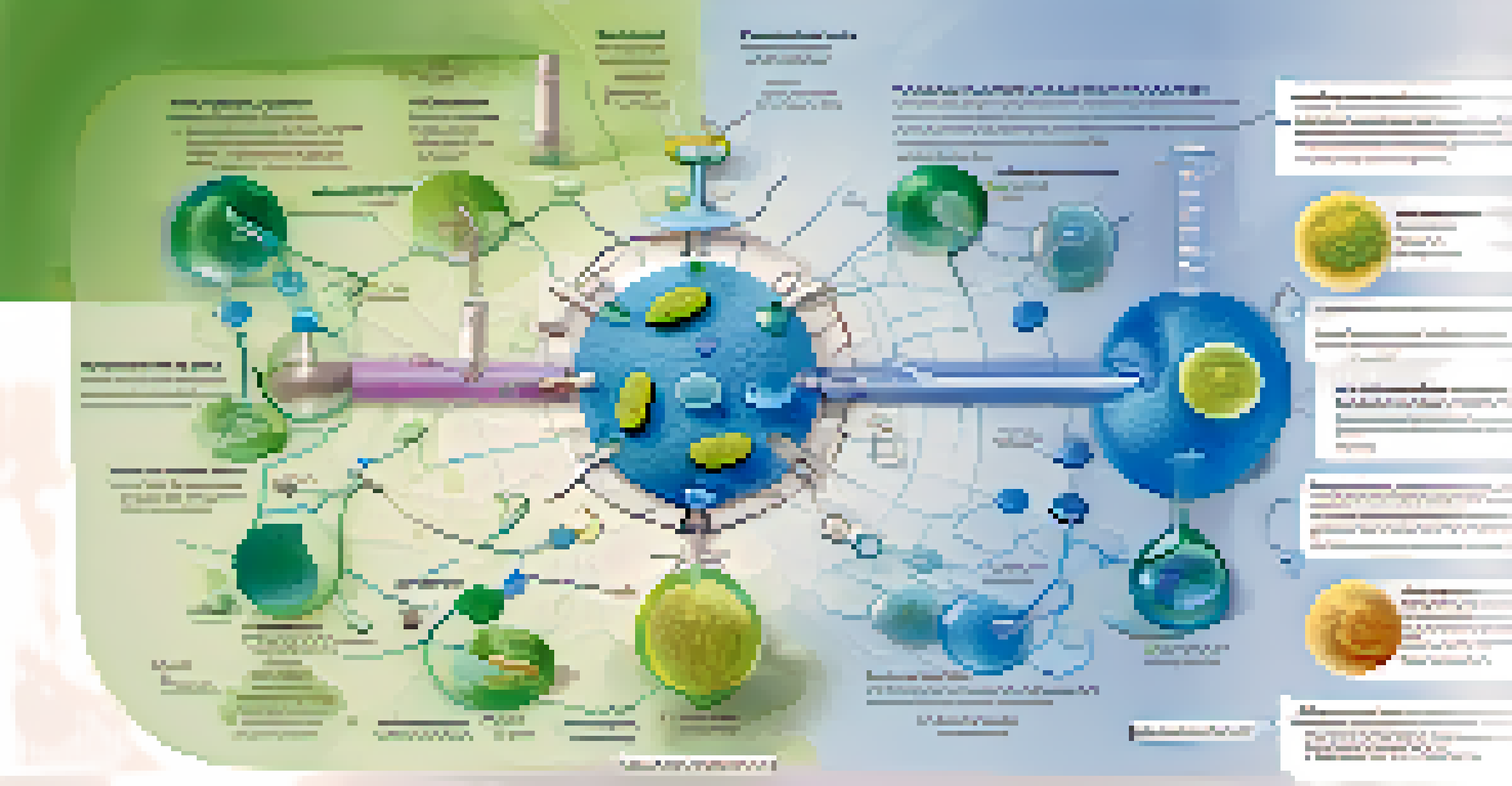Understanding the Role of Adjuvants in Vaccines

What Are Adjuvants and Their Purpose in Vaccines?
Adjuvants are substances added to vaccines to boost the body's immune response. They play a crucial role in enhancing the effectiveness of vaccines by helping the immune system recognize and respond to the antigens. Think of them as helpful allies, ensuring that the vaccine triggers a strong and lasting defense against diseases.
Vaccines are like a rehearsal for the immune system; adjuvants help ensure the performance is a triumph.
Without adjuvants, some vaccines might not provoke a sufficient immune response, leading to decreased protection. For instance, a vaccine with a weak antigen might result in a short-lived immunity if not combined with an adjuvant. By improving the immune response, adjuvants help ensure that individuals are better protected against infections.
Essentially, adjuvants help vaccines work smarter, not just harder. They can improve the quality of the immune response, often allowing for lower doses of the active ingredient. This is especially beneficial during mass vaccination campaigns, where dosage efficiency is key.
Types of Adjuvants Used in Vaccines
There are several types of adjuvants used in vaccines, each serving unique functions. Some common examples include aluminum salts, oil-in-water emulsions, and toll-like receptor agonists. Aluminum salts are the most widely used adjuvants and have been a staple in vaccine formulation for decades.

Oil-in-water emulsions, like MF59, create a depot effect, slowly releasing the antigen and prolonging the immune response. On the other hand, toll-like receptor agonists stimulate the immune system's innate response, which can enhance the adaptive immune response. This variety allows scientists to tailor vaccines for specific diseases.
Adjuvants Boost Vaccine Effectiveness
Adjuvants are essential for enhancing the immune response, ensuring vaccines provide stronger and longer-lasting protection against diseases.
Understanding these different types helps illustrate how adjuvants can be strategically chosen based on the target disease and the desired immune response. Each adjuvant type brings its own strengths to the table, enabling vaccine developers to create more effective immunizations.
The Science Behind How Adjuvants Work
Adjuvants operate by various mechanisms to enhance the immune response. They can stimulate antigen-presenting cells (APCs), which play a vital role in activating T-cells and B-cells. This activation is essential for the body to recognize and remember pathogens, ensuring a faster response if re-exposed.
The success of a vaccine often hinges on the use of adjuvants, which can enhance the immune response and ultimately save lives.
Some adjuvants can also induce local inflammation, attracting immune cells to the injection site. This process enhances the overall immune response and promotes a stronger and more comprehensive defense against the disease. It’s a bit like rallying a team of defenders to be on high alert.
Additionally, adjuvants may influence the type of immune response generated, whether it’s more antibody-focused or cell-mediated. This flexibility allows researchers to design vaccines that target specific pathogens more effectively.
Safety and Regulatory Aspects of Adjuvants
Safety is paramount when it comes to vaccine development, and adjuvants are no exception. Regulatory agencies, such as the FDA, closely evaluate the safety of adjuvants before they are approved for public use. This process ensures that any potential risks are clearly understood and weighed against the benefits of vaccination.
Most adjuvants, like aluminum salts, have a long history of safe use in vaccines. However, ongoing research is crucial to monitor any long-term effects and to continue improving safety profiles. Think of this as a continuous quality check to ensure that public health remains the top priority.
Diverse Types of Adjuvants Available
Various adjuvants, such as aluminum salts and oil-in-water emulsions, are tailored to optimize the immune response based on specific diseases.
In recent years, new adjuvants have emerged, sparking discussions about their safety and efficacy. As science progresses, the regulatory landscape adapts, aiming to strike a balance between innovation and safety.
Adjuvants in COVID-19 Vaccines: A Key Component
The COVID-19 pandemic brought adjuvants to the forefront of vaccine discussions. Many of the vaccines developed during this time utilized adjuvants to enhance the immune response against the virus. For example, the Pfizer-BioNTech and Moderna vaccines included lipid nanoparticles that serve as adjuvants, helping to deliver the mRNA effectively.
These innovative approaches showcased how adjuvants can be adapted for new technologies and diseases. The rapid development of COVID-19 vaccines highlighted the critical role of adjuvants in achieving robust immunity in a short time frame, emphasizing their significance in public health.
As we move forward, understanding the role of adjuvants in COVID-19 vaccines could inform future vaccine strategies. It also underscores the importance of research and development in the field of immunization.
The Future of Adjuvants in Vaccine Development
The future of adjuvants looks promising, with ongoing research aimed at discovering new and more effective formulations. Scientists are exploring novel adjuvants that can enhance immune responses against a broader range of pathogens, including emerging infectious diseases. This innovation could lead to vaccines that provide longer-lasting immunity.
Additionally, advancements in nanotechnology are paving the way for more targeted delivery systems. These systems can potentially improve vaccine uptake and enhance the efficiency of adjuvants. Imagine a more precise method of delivering the vaccine right where it’s needed in the body!
Adjuvants Critical in COVID-19 Vaccines
During the COVID-19 pandemic, adjuvants played a key role in developing vaccines that effectively enhanced immunity against the virus.
As we continue to explore the complexities of the immune system, the role of adjuvants will likely evolve. This adaptation will be crucial in addressing global health challenges and ensuring effective responses to future pandemics.
Conclusion: The Importance of Adjuvants in Vaccination
In conclusion, adjuvants play a vital role in making vaccines more effective and safer. Their ability to enhance the immune response can mean the difference between a mediocre vaccine and one that provides robust protection against diseases. By understanding how they work, we can appreciate the science behind vaccination.
As new challenges arise in public health, the continued research and development of adjuvants will be essential. They are the unsung heroes in the fight against infectious diseases, working tirelessly to ensure that our immune systems are prepared.

Ultimately, a deeper understanding of adjuvants not only enlightens us about vaccines but also empowers us to make informed health decisions. As we move forward, let’s recognize the importance of these substances in safeguarding our health.